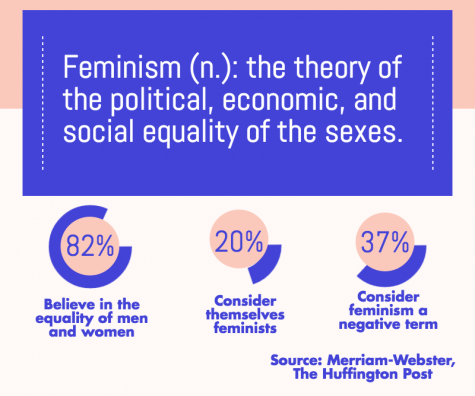Opinions: The importance of feminism
Reflecting on the state of women
April 16, 2017
I am proudly a feminist, but I do not blindly label myself as such. By definition, feminism is the belief in the equality of women to men, but it means much more than just that to me.
Feminism is not just a catch-all term for women’s rights. Intersectional feminism strives to incorporate the rights of black women, Latina women, Muslim women, Jewish women and LGBTQ women. Recognizing minority groups of women who experience sexism in their own and distinctive ways is vital to the inclusiveness of feminism. We as feminists often get caught up in idolizing women like Emma Watson and Meryl Streep, who although promote undoubtedly important feminist agendas, do not represent or include rhetoric pertaining to minority women. The more diversity of perspectives represented by feminism in the media, the more diverse and strong the movement will become.
Feminism is not just about women. Although erasing stereotypes and standards of who women are and what we do is a large part of the feminist agenda, feminism also encompasses fighting for the removal of expectations and standards about what men are supposed to be. Feminism works to foster a society that does not associate activities, clothes or any distinctions with any gender.

According to a Huffington Post poll, 82 percent of those surveyed believe in the political, social and economic equality of the sexes, Merriam-Webster Dictonary’s definition of feminism. Despite this, only 20 percent identify as feminists and 37 percent consider it a negative term.
There is a huge discrepancy between those who believe in gender equality, feminism’s basic definition, and those who identify as feminists. Many people don’t identify as feminists because they feel feminism is overly victimizing or feel they do not experience and witness oppression.
The feminist movement is not without its problems. Far too often, we as feminists condemn body image standards, yet body shame each other. We promote making our own choices regarding our bodies and how we dress but judge those of others. We promote inclusiveness in our movement yet seldom live up to such with nearly all white feminist icons. We want lawmakers of both parties to fight for feminist issues but often only approve of a narrow agenda.
Although modern-day feminism has much work to do to be a fully inclusive and forthright movement, ignoring sexism and feminist issues does nothing to help the problem of gender inequality. Feminism is an outlet for turning gender equality concerns into cultural change, but can only do so with feminist support.
The fundamental purpose of feminism is to empower people to understand the experiences of those different from them through for the similar, yet broad aim of gender equality. Feminism gives me a way to understand the past and present of women like me, and provides an outlet for me to have a say in the future. More importantly, feminism also provides me a means to connect with women who experience sexist micro- and macro-aggressions in different ways.
Gender equality is a matter of fundamental human rights and it something we should all believe in. When no race, religion, sexualality or gender is held to specific standards, we all benefit. We should all believe in this fundamental issue of gender equality, and thus to strive towards creating this, we should all be feminists.





Njemu Yegela • Feb 4, 2020 at 7:03 am
Why Feminism is considered like the game of complaining within Women rather than the bridge of connecting between Men and Women in realizing the Community potentials for all People regardless of.?
faisal • Sep 15, 2019 at 6:10 am
this article covers the importance of women rights and importance of feminism if you want to know about the rights of women then you can visit here women rights
Utpal • Nov 13, 2018 at 8:53 am
As assumptions me feminism is for everybody in the society